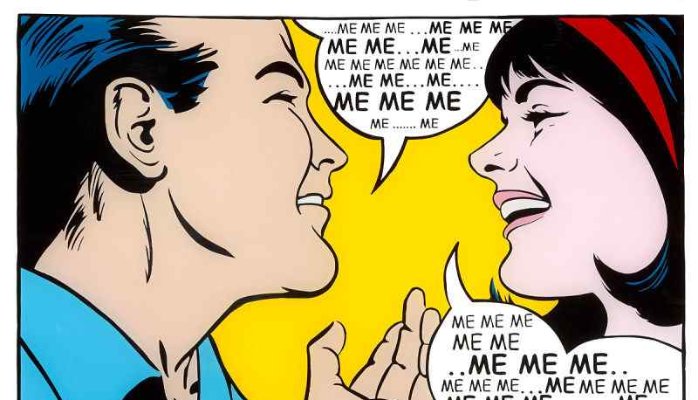Let me go ahead and get you a definition of “conversational narcissism” from here:
Sociologist Charles Derber describes this tendency as “conversational narcissism.” Often subtle and unconscious, it’s the desire to take over a conversation, to do most of the talking, and to turn the focus of the exchange to yourself. Derber writes that it “is the key manifestation of the dominant attention-getting psychology in America.”
Wow. Lot to unpack here. By the way, the article I linked out is from TED and it’s about why you shouldn’t say “I know exactly how you feel.” Read it. It’s interesting.
Conversational narcissism and the wrong 80-20
The “right” 80-20 is listen 80 percent of a conversation, talk about your own stuff 20 percent.
The wrong 80-20 would flip that — and in the process be the definition of conversational narcissism.
What a networking event typically looks like
Me, standing by myself.
Guy approaches.
“Hey man (business card comes out) I’m Dan with Custom Window Screenings about 30 minutes from here. Are you in the market for window screenings? We have a new vinyl product line I’d love to show you. Take my card.”
“Why would window screens need to be vinyl…?”
“Well nice talking with you Eric…”
“I never actually gave you my name.”
“I need to go over there, I see a hot prospect. Call/e-mail me. I’ll get you a great deal.”
Is this exaggerated? Yes.
Did essentially this conversation happen to me in February 2016?
Also yes.
Conversational narcissism is pretty real, and we’ve all lived through it.
Where does conversational narcissism come from?
Couple of quick ideas:
- The currency of the modern age is attention; conversational narcissism isn’t really attention — listening would empower attention — but many of us don’t realize that
- We’re clueless buffoons
- We view ourselves as very interesting
- Don’t know better
What are the repercussions?
Many.
It can make networking events fairly painful.
The whole deal with the rise of social isolation and loneliness can be connected here. If everyone is always talking about themselves, wouldn’t that make a few others feel sad and lonely?
The idea of conversational narcissism is also how a lot of people feel about conventional marketing and sales. BUY MY COURSE AND MY UPSELL I PROMISE IT’S GOOD SEE THE TESTIMONIALS? It feels like there’s no way to have a conversation with some of these marketing channels. It’s just being talked at, sold to. That’s conversational narcissism.
Social media is also essentially conversational narcissism. Many people use it to not to exchange ideas (a conversation), but to hoist their specific ideas on the world (conversational narcissism). Talking without listening. Add vacation/baby/wedding photos to that and I just summarized social media in a few lines.
It also harms a ton of marriages.
Overall, none of it good.
So how do we fix conversational narcissism?
“We” don’t. It’s an individual level issue.
First things first: we need to teach empathy to adults. Long road, but can be done.
Second: gotta rethink the idea of networking.
Third: understand the four factors that make people listen to you.
Fourth: think on the yin-yang of how people make conversation.
Fifth: realize how to ask intelligent questions, and what that can do for a convo.
That’s probably a little out of order, but it’s five pathways there.
Conversational narcissism is almost entirely bad, and unfortunately defines many touchpoints of (at least) American society. Let’s all try to listen a bit more and reduce this concept, yesh?
